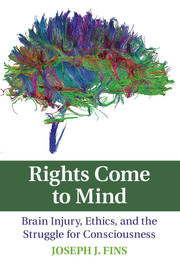Book contents
- Frontmatter
- Dedication
- Epigraph
- Contents
- Miscellaneous Frontmatter
- Acknowledgments
- Introduction
- 1 Decisions
- 2 The Injury
- 3 Coming to Terms with Brain Injury
- 4 The Origins of the Vegetative State
- 5 A Shift since Quinlan
- 6 Maggie's Wishes
- 7 Something Happened in Arkansas
- 8 From PVS to MCS
- 9 Leaving the Hospital
- 10 Heather's Story
- 11 Neuroimaging and Neuroscience in the Public Mind
- 12 Contractures and Contradictions: Medical Necessity and the Injured Brain
- 13 Minds, Monuments, and Moments
- 14 Heads and Hearts, Toil and Tears
- 15 What Do Families Want?
- 16 Deep Brain Stimulation in MCS
- 17 Mending Our Brains, Minding Our Ethics
- 18 It's Still Freedom
- 19 Maggie Is in Town
- 20 When Consciousness Becomes Prosthetic
- 21 The Rights of Mind
- 22 A Call for Advocacy
- Epilogue
- Notes
- In Memoriam
- Index
17 - Mending Our Brains, Minding Our Ethics
Published online by Cambridge University Press: 05 September 2015
- Frontmatter
- Dedication
- Epigraph
- Contents
- Miscellaneous Frontmatter
- Acknowledgments
- Introduction
- 1 Decisions
- 2 The Injury
- 3 Coming to Terms with Brain Injury
- 4 The Origins of the Vegetative State
- 5 A Shift since Quinlan
- 6 Maggie's Wishes
- 7 Something Happened in Arkansas
- 8 From PVS to MCS
- 9 Leaving the Hospital
- 10 Heather's Story
- 11 Neuroimaging and Neuroscience in the Public Mind
- 12 Contractures and Contradictions: Medical Necessity and the Injured Brain
- 13 Minds, Monuments, and Moments
- 14 Heads and Hearts, Toil and Tears
- 15 What Do Families Want?
- 16 Deep Brain Stimulation in MCS
- 17 Mending Our Brains, Minding Our Ethics
- 18 It's Still Freedom
- 19 Maggie Is in Town
- 20 When Consciousness Becomes Prosthetic
- 21 The Rights of Mind
- 22 A Call for Advocacy
- Epilogue
- Notes
- In Memoriam
- Index
Summary
Chance and Prepared Minds
I first met Niko after he submitted his patent. He was a few years behind me at Cornell and I knew him by reputation as someone who was deeply interested in consciousness and had a close relationship with Fred Plum. As a former student of Dr. Plum's, I was really impressed by his proximity to a professor who had a reputation for both toughness and excellence. If Niko had been taken into that club, he had to be both tough and excellent.
At the time, I had just founded the first hospital-wide ethics committee at The New York Hospital and was busy doing ethics consults, most of which related to questions at life's end. On a national level, I was working to develop the field of palliative care, building scholarly bridges between clinical ethics and that nascent area of medical practice.
To that end, I was editor of a section in the Journal of Pain and Symptom Management called “Ethics Rounds.” Its purpose was to address ethical dilemmas in end-of-life care. Typically, I would line up a case with two commentators with opposing or supplementing points of view. I had received a case from Bezalel Dantz who was doing a joint residency in medicine and psychiatry at the New York–Presbyterian Weill Cornell Medical Center, in which the question arose whether or not comatose patients should receive opioid analgesia for pain control.
The patient in the case was a fifty-nine-year-old woman with metastatic breast cancer to the brain. On a political level it was a question about the right-to-die, double-effect, and whether a morphine drip was providing relief or hastening death. That was the conventional read at the time.
But there was something more profound about the case, and that was whether or not unconscious patients perceive pain and experience distress? I wanted someone to comment intelligently on the question of consciousness and pain. By chance, I ran into Niko at the coffee shop at The New York Hospital.
- Type
- Chapter
- Information
- Rights Come to MindBrain Injury, Ethics, and the Struggle for Consciousness, pp. 216 - 226Publisher: Cambridge University PressPrint publication year: 2015



